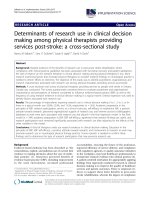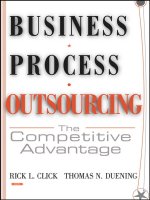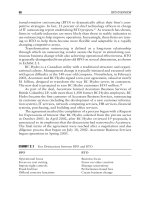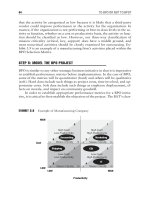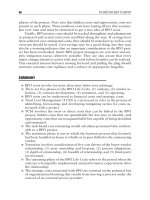Lecture Judgment in managerial decision making (8e) - Chapter 2: Overconfidence
Bạn đang xem bản rút gọn của tài liệu. Xem và tải ngay bản đầy đủ của tài liệu tại đây (153.22 KB, 10 trang )
Judgment in Managerial Decision
Making 8e
Chapter 2
Overconfidence
Copyright 2013 John Wiley &
Sons
Write Your 98% Confidence
Intervals
Point
Estimate
Lower
Estimate
Upper
Estimate
Wal-Mart’s 2010 revenue
Google’s 2010 revenue
World population
(as of January 2012)
2012 US GDP
Population of China
(as of December 2011)
Rank of McDonald’s in 2010
Fortune 500
Rank of General Electric in
2010 Fortune 500
The national debt of Greece
(as of December 2011, in
Euros)
The Mother of All Biases
•
Overconfidence is considered robust
•
Some consequences of overconfidence:
–
Wars
–
Stock market bubbles
–
Strikes
–
Unnecessary lawsuits
–
High rates of entrepreneurial failure
–
Failure of mergers and acquisitions
Three Forms of Overconfidence
Overprecision
Overestimation
Overplacement
Being too certain that
you know the truth.
•
Excessive certainty in
our accuracy
•
Lack of interest in
testing assumptions
•
Dismissing evidence
suggesting we’re
incorrect
•
Overly narrow
confidence intervals
Thinking you are better Falsely thinking that
than you really are.
you are better than
•
Overestimating your
others.
•
productivity
Negotiating with
•
Overestimating your
superior others
•
control
Representing yourself
•
Overestimating your
in court
•
test scores
Entering a prestigious
•
Overestimating your
competition
•
attractiveness
Founding a start-up
Are You Overprecise?
Point Estimate
$421 billion
Wal-Mart’s 2010 revenue
$29 billion
Google’s 2010 revenue
7 billion
World population
(as of January 2012)
$15 trillion
2012 US GDP
$1.3 billion
Population of China
(as of December 2011)
108
Rank of McDonald’s in 2010 Fortune 500
4
Rank of General Electric in 2010 Fortune 500
€341 billion
The national debt of Greece
(as of December 2011, in Euros)
What Causes Overprecision?
•
Lacking knowledge about a topic
•
We are rewarded for overprecision
•
We don’t seek contradictory evidence
Consequences of Overprecision
•
Ignoring feedback from others
•
Active portfolio management
•
Spending hours interviewing job
candidates
Consequences of
Overestimation
•
Self-enhancement
•
The illusion of control
•
The planning fallacy
•
Optimistic biases
Consequences of
Overplacement
•
Inflated expectations of success
•
Excessive legal costs
•
Over-entry into markets
•
Mergers and acquisitions
•
Choosing the wrong occupations
Well-Calibrated DecisionMaking
•
Do positive illusions have benefits?
•
Adverse effects of positive illusions:
–
Conflict
–
Over-claiming credit
–
Inability to learn from mistakes
–
Dishonest behavior
–
Hits to our credibility
–
Less effort on tasks





